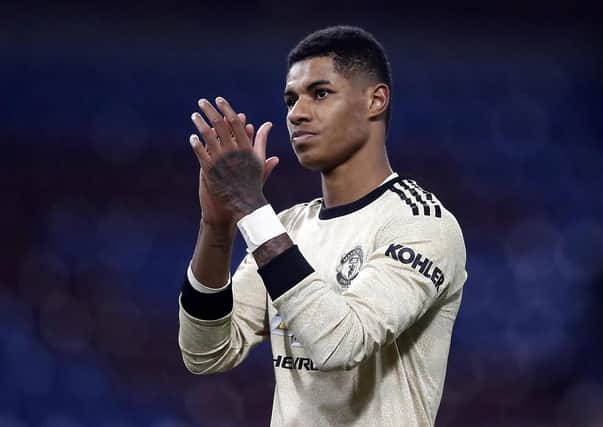How Marcus Rashford revealed the price of identity politics – Brian Wilson


Marcus Rashford reminded us this week what progressive politics can be about – focused, grounded in experience and winning a practical victory for those in greatest need.
Not that anyone should try to pin a political badge on Mr Rashford. He is far more valuable when his only job description is “of Manchester United and England”.
Advertisement
Hide AdAdvertisement
Hide AdWithin 24 hours of his superb letter to MPs, the governments responsible for education in England and Scotland had announced continuation of free school meals through the summer holidays, Wales having led the way in April.
In an age when identity politics has become the norm, this episode should remind us that the basic divide is (or should be) what it always has been – between those who have most and those who have least.
The territory within which practical politics operates involves shifts in either direction. They may not be dramatic but they have an intense effect, for good or ill, on the life prospects of millions.
You don’t get much more basic than the question of whether children, in 21st century Britain, should go hungry when (as now confirmed) it is well within the power of government to prevent that with the stroke of a pen.
In the normal course of events, that question can be brushed aside. To our collective shame, the wrong answer no longer carries political cost – until someone comes along to ask it in a manner that is unanswerable. Step forward, Marcus Rashford.
At Prime Minister’s questions, Sir Keir Starmer followed up by drawing attention to the Government’s own Social Mobility Commission report which projects that child poverty will increase to 5.2 million by 2022 – a statistic that should cause outrage.
It was clear Mr Johnson knew nothing of this report and cared less. Denial and bluster were his only weapons. Yet these statistics are as good a measure as any of how the pendulum swings within the contested area of politics.
Between 1997 and 2010, the number of children living in poverty fell dramatically. In Scotland, the Rowntree Foundation warns that since then “progress has been unravelling with children, parents and pensioners all seeing their risk of being trapped in poverty rising again”.
Advertisement
Hide AdAdvertisement
Hide AdLabour’s failure over the last, lost decade to make itself electable has resulted in the gains made in the preceding one being eroded. Those, within Labour and elsewhere, who poured contempt on the Blair governments from a supposedly left perspective gave us instead Tory rule with utterly predictable outcomes and the poor paying the price. Identity politics are at their most powerful when they intersect, rather than compete, with socio-economic divisions. One refreshing aspect of Marcus Rashford’s intervention was that it transcended the current focus on race. It was on behalf of all children who share the same circumstances, regardless of nationality, colour or creed.
Of course there are issues of race and gender equality which demand reform in their own right; historic wrongs to be righted. But many will be addressed most effectively through a fairer distribution of wealth and opportunity which would benefit every child of every background.
In Scotland, identity politics distort far more than they reveal. When everything is seen through the prism of being different or done down, it creates an environment in which that basic question can be evaded – what are we doing in reality to change the balance between haves and have-nots?
That is most obviously true in education where the pan-Scottish priority of “free” university tuition actually leaves the poorest students with the highest levels of debt, makes the better-off a little more comfortable and has almost bankrupted most of our universities. There is absolutely nothing progressive about that cocktail.
Imagine the difference if, instead, the relentless priority had been to give Scotland’s poorest kids the best possible education as a means of erasing inter-generational disadvantage. By now, the fruits of that policy would be reflected in every aspect of our society. And it was all within our powers.
Call that class politics if you like or, if you prefer Marcus Rashford’s disclaimer: “This is not about politics. It is about humanity.”
A message from the Editor:
Thank you for reading this article on our website. While I have your attention, I also have an important request to make of you.
With the coronavirus lockdown having a major impact on many of our advertisers - and consequently the revenue we receive - we are more reliant than ever on you taking out a digital subscription.
Advertisement
Hide AdAdvertisement
Hide AdSubscribe to scotsman.com and enjoy unlimited access to Scottish news and information online and on our app. With a digital subscription, you can read more than 5 articles, see fewer ads, enjoy faster load times, and get access to exclusive newsletters and content. Visit www.scotsman.com/subscriptions now to sign up.
Our journalism costs money and we rely on advertising, print and digital revenues to help to support them. By supporting us, we are able to support you in providing trusted, fact-checked content for this website.
Joy Yates
Editorial Director
Comments
Want to join the conversation? Please or to comment on this article.